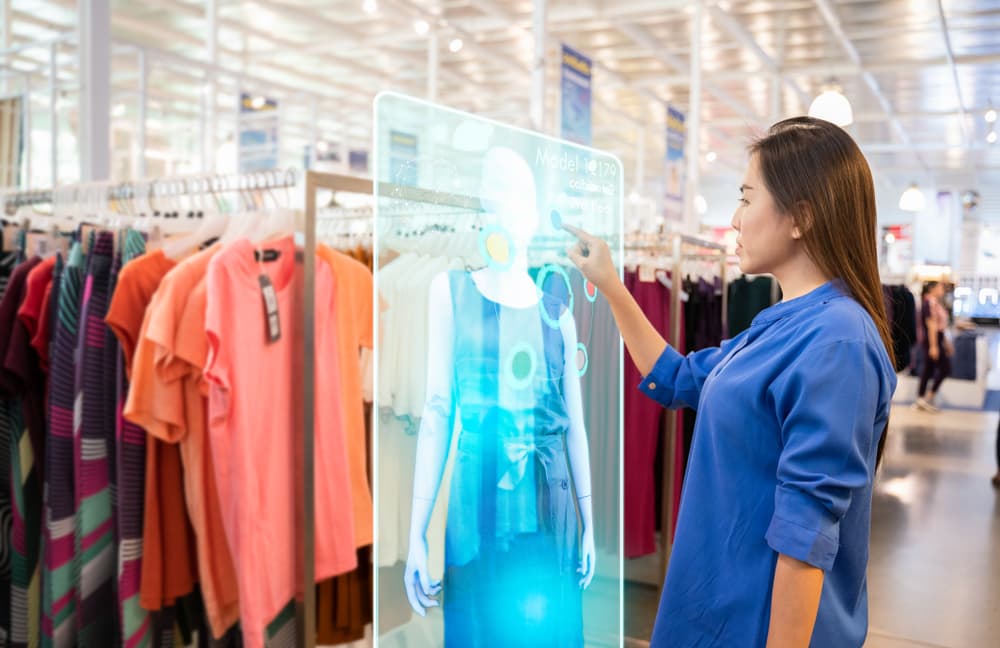Generative AI's Effect On Brick-And-Mortar Retail

On this page
In today's fast-paced digital era, retailers continually seek innovative ways to stay ahead of the competition and enhance the shopping experience. One technology that has gained significant attention is generative artificial intelligence (AI). In this blog, we explore what generative AI is, why retailers should pay attention to it, and how it can transform brick-and-mortar retail. Additionally, we highlight real-life examples of retailers who have successfully utilized generative AI to drive in-store sales and loyalty programs.
READ MORE: 3 In-Store Analytics Case Studies Every Retailer Should Read
Understanding Generative AI
Generative AI refers to a subset of artificial intelligence techniques that involve training models to generate new, original content such as images, videos, or text. The most prominent example is Chat GPT, a text-generating chatbot, whose userbase grew by an explosive 9,900% in just 60 days of launch. According to Reuters, this generative AI wunderkind is the fastest-growing consumer application in history. For perspective, it took TikTok about nine months after its global launch to reach similar usage stats, and Instagram took 2,5 years. The innovation and resultant curiosity around generative AI are at an all-time high.
Unlike traditional AI, which relies on pre-existing data, generative AI has the remarkable ability to create unique and original content autonomously. By leveraging deep learning algorithms and neural networks, generative AI can mimic human creativity and produce outputs that are highly realistic and indistinguishable from human-created content.
While some have raised concerns about the unparalleled power of generative AI (most remarkably regarding the threat it poses to jobs), it is key to note that this technology can help humans perform their jobs more efficiently. In retail, the opportunity to operationalize this technology is essentially endless.
Why Retailers Should Pay Attention
Brick-and-mortar retailers have traditionally faced the challenge of competing with the convenience and personalization of online shopping. Generative AI presents an exciting opportunity for physical stores to bridge the gap and offer novel, engaging experiences to customers. Here's why retailers should pay attention to generative AI:
Personalized Product Recommendations: Generative AI algorithms can analyze vast amounts of customer data, including purchasing history, preferences, and social media interactions, to generate highly personalized product recommendations. This enables retailers to offer targeted suggestions to build loyalty and enhance the overall shopping experience. Starbucks utilizes its mobile app as a key component of its personalized customer experience. The app collects and analyzes various data points, including purchase history, preferences, and location information, to deliver tailored recommendations and offers to individual customers. Using AI algorithms, Starbucks can understand each customer's unique preferences and create personalized suggestions for drinks, food items, and promotional offers. Starbucks' successful implementation of AI-driven personalization in its brick-and-mortar stores demonstrates how technology can be harnessed to create meaningful and tailored experiences for customers in physical retail/hospitality environments.
Virtual Try-On Experiences: Generative AI can create realistic virtual representations of products, allowing customers to virtually try on clothing, accessories, or even makeup. This immersive experience enhances customer engagement and helps reduce the need for physical inventory, leading to cost savings for retailers. Sephora utilizes generative AI to power its Virtual Artist augmented reality engine. Customers can use the Sephora app to virtually try on makeup products and experiment with different looks, all from the convenience of their smartphones. This not only enhances the shopping experience but also increases the likelihood of purchase and brand loyalty.

Interactive Visual Displays: With generative AI, retailers can create captivating visual displays that react and adapt to customer interactions. By detecting customer gestures or movements, these displays can offer a unique and interactive experience that captures attention and drives foot traffic. By leveraging generative AI, Adidas introduced its innovative "Knit for You" concept in a pop-up store format. Customers can design custom knit sweaters using an interactive display that adapts in real time to their design choices. This unique personalized experience has garnered significant attention and created a buzz, ultimately driving foot traffic and sales.
READ MORE: Understanding ‘Hyperphysical’ Luxury Retail
How This Tech Helps Store Teams
Generative AI can provide valuable support to store associates in brick-and-mortar stores, empowering them to deliver enhanced customer experiences and improve their overall efficiency. From product catalogs to chatbots, generative AI integration can help store teams boost performance, easily share product or brand information, and spend quality time with customers to build trust and increase conversion.
Sales associates require support to sell, and as the world evolves to become more digital, so must their BI tools. Generative AI can create virtual product catalogs that store associates can access through tablets or interactive displays. These catalogs can showcase a vast range of products, including variations in colors, sizes, and styles. By utilizing generative AI-generated visuals, store associates can provide customers with a comprehensive view of available products conveniently and professionally. This technology enables associates to showcase a wider inventory and help customers make informed purchasing decisions.
These AI models can also facilitate real-time inventory management, providing store associates with accurate and up-to-date information about product availability, stock levels, and replenishment needs. With AI-powered systems, associates can quickly check inventory levels, locate items within the store, and offer alternative options to customers if a particular product is out of stock. This streamlines the shopping process, minimizes customer frustration and friction, and improves operational efficiency. Gone are the days of running to check the stock in the back!
AI-powered chatbots or virtual assistants can be integrated into store systems to provide quick answers to common customer inquiries, freeing up associates' time to focus on more complex or personalized interactions. By offloading routine tasks, generative AI allows associates to dedicate more time and attention to customers, providing a higher level of service and fostering positive customer relationships.
READ MORE: Key Trends Driving Europe’s Retail (R)evolution
Generative AI holds immense potential for revolutionizing brick-and-mortar retail. By leveraging this technology, retailers can create personalized experiences, offer virtual try-on, and engage customers with interactive displays, thereby reimagining the in-store shopping journey. As seen through examples such as Sephora and Adidas, generative AI has increased sales, customer engagement, and loyalty.
Retailers embracing and harnessing the power of generative AI stand to thrive in the ever-evolving retail landscape, redefining what physical stores can achieve. When implemented responsibly and intentionally, brick-and-mortar retailers can use generative AI to design engaging stores, drive customer loyalty through personalization, better support store staff, and create frictionless in-store experiences.
In this time of immense, rapid tech innovation, it will be fascinating to see how retailers operationalize these applications and navigate territory-specific guardrails. It's an exciting time to be watching history unfold both on- and offline.
About the author:

Ashton Kirsten, Global Brand Manager, RetailNext
Ashton holds a Master's Degree in English and is passionate about physical retail's unbridled potential to excite, entertain, serve, and solve problems for today's shoppers.



